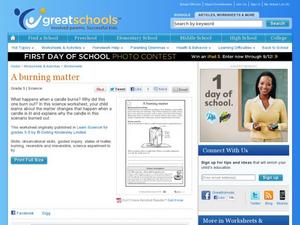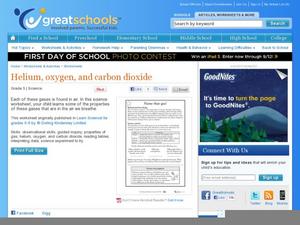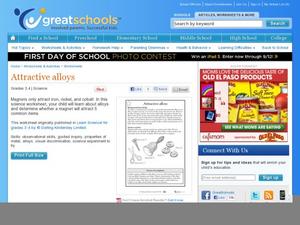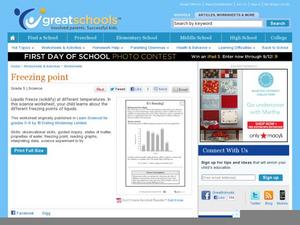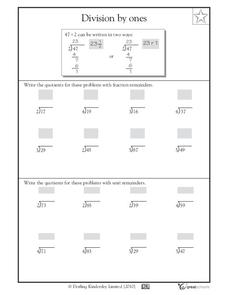Curated OER
Journey to Tibet
Students create "Culturegrams" from the library and travel guides provided during class. They use the library and PC lab during study hall to work on a PowerPoint presentation and show the PowerPoint to the class to describe your trip.
Curated OER
Are We There Yet? The Changing Pocono Vacation
Students study the Poconos and the importance of the resorts there. In this Poconos lesson plan students research and plan a travel itinerary to the Poconos.
Curated OER
Animal Habitats
Elementary schoolers complete a worksheet that has them decide which of four environments a variety of animals live in. The environments are: pond, soil, ocean, and woodland. There are 12 different types of animals that pupils must match...
Curated OER
Animal Homes
Match animals to their environments with a cute lab activity. Kids draw a line between each animal, such as a fish, a rabbit, and an ant, to the place where it lives. For hands-on practice, a science investigation instructs learners to...
Curated OER
Cool Stuff
Young scientists must place a check mark next to the answer they think is correct regarding things that are warm, cool, hard, and soft. This would be a good way to begin discussing how some things actually change states of matter...
DK Publishing
A Burning Matter
The process of fire requires oxygen, heat, and fuel. Take one of those away, and fire ceases to exist. That's the idea behind this worksheet which portrays a candle burning inside an upside down jar. Pupils answer a couple of questions...
Curated OER
A Device That Condenses Water
Fifth graders who are studying water vapor and the condensation process use this worksheet to help them understand the process of condensation. Most of the worksheet is simply a source of information, with a good descriptive paragraph...
Curated OER
For a Change
Here is a worksheet that has young scientists think about things that been changed as a result of heating and cooling, and if they can be returned to their original form. There are seven scenarios to consider, and they must choose,...
Curated OER
Name That Gas!
Young scientists discover that air is a mixture of different gases - mainly nitrogen and oxygen. The properties of some of the other gases found in oxygen are listed in a table, then learners must decide which one of those gases is...
Curated OER
Is It See-Through?
Explore transparancy with a science experiment on different materials. After reading an explanation on how to determine if something is see-through with a flashlight, kindergartners decide if certain materials are opaque or not....
Curated OER
Bar Graphs and Pictographs
How are bar graphs and pictographs different? As you begin this concept, use these simple graphs to help get learners started with data analysis styles. There is one bar graph and one pictograph, each accompanied by four or five...
Curated OER
Question Marks
Context clues are important when understanding the intent of a sentence. Kindergartners read eight sentences, and decide if each should end in a period or in a question mark. The last two questions prompt kids to draw a mouse and a cat,...
Curated OER
Attractive Alloys
Include a lab about alloys and magnets in your fourth grade science lesson. Young scientists read the necessary background knowledge about alloys, then choose which objects (a screw, a bell, scissors, or coins) will be attracted to...
Curated OER
It's too loud!
Investigate soft, loud, and dangerous sounds. Little ones put a check next to the sounds that are loud, an X next to ones that are soft, and circle the ones that would require protective ear wear. Tip: Get out a tape player or computer...
Utah Education Network (UEN)
Geo Shapes
Invite your first graders to compose and decompose two and three-dimensional figures with this fun, hands-on lesson. They investigate and predict the results of putting together and taking apart two-dimensional shapes with rubber bands...
Curated OER
The Green Truck Garden Giveaway
Students read "The Green Truck Garden Giveaway" and explore the hobby of gardening. After observing illustrations in the book, students predict possible events in the story. They discuss gardening and write a story about a community...
Curated OER
Coordinate Graphs
As you introduce coordinate graphs to scholars, be sure to use guided worksheets like this one. Using an example for guidance, they write the coordinates of five points on a graph, each distinguished as a shape symbol. Next, scholars do...
Curated OER
Attract or Repel?
Opposites attract with a fun science experiment on magnets. With a short paragraph on background knowledge, the lab sheet prompts third and fourth graders to choose which pairs of magnets will attract, and which pairs will repel. A...
Curated OER
Commas
Learning how to properly use the comma is an important writing skill. This instructional activity, designed for first graders, gives them some coaching on the subject along with opportunities to practice. There are five sentences which...
Curated OER
Can You Bag It?
Put your class's observational skills to the test with a science experiment about paper and plastic bags. After reading some background knowledge about the materials in plastic grocery bags, third graders interpret a chart to answer a...
Curated OER
It's Freezing!
Here is a good worksheet for 5th grade scientists. In it, they look at a bar graph that shows the freezing point for a variety of liquids. Then, they are given a scenario of a certain liquid melting and freezing, and must determine which...
Curated OER
On the Right Circuit
After a discussion on how to make a light bulb light up in an electrical circuit, young scientists take a look at four circuits, and they choose the one they think will make the lightbulb light up. Use in conjunction with any initial...
Curated OER
Division by 1-Digit Numbers #2
Start simple as mathematicians begin long division with remainders. These 16 problems are in two sections with fraction remainders in the first eight and unit remainders in the second eight. Each problem has a single-digit divisor and...
Curated OER
Exercise and the Human Heart
Interpret data and learn about the human heart in one activity! After learning about the way blood flows in the body, fifth graders answer two questions about a graph displaying pulse rate. They then take their own pulses to find the...







